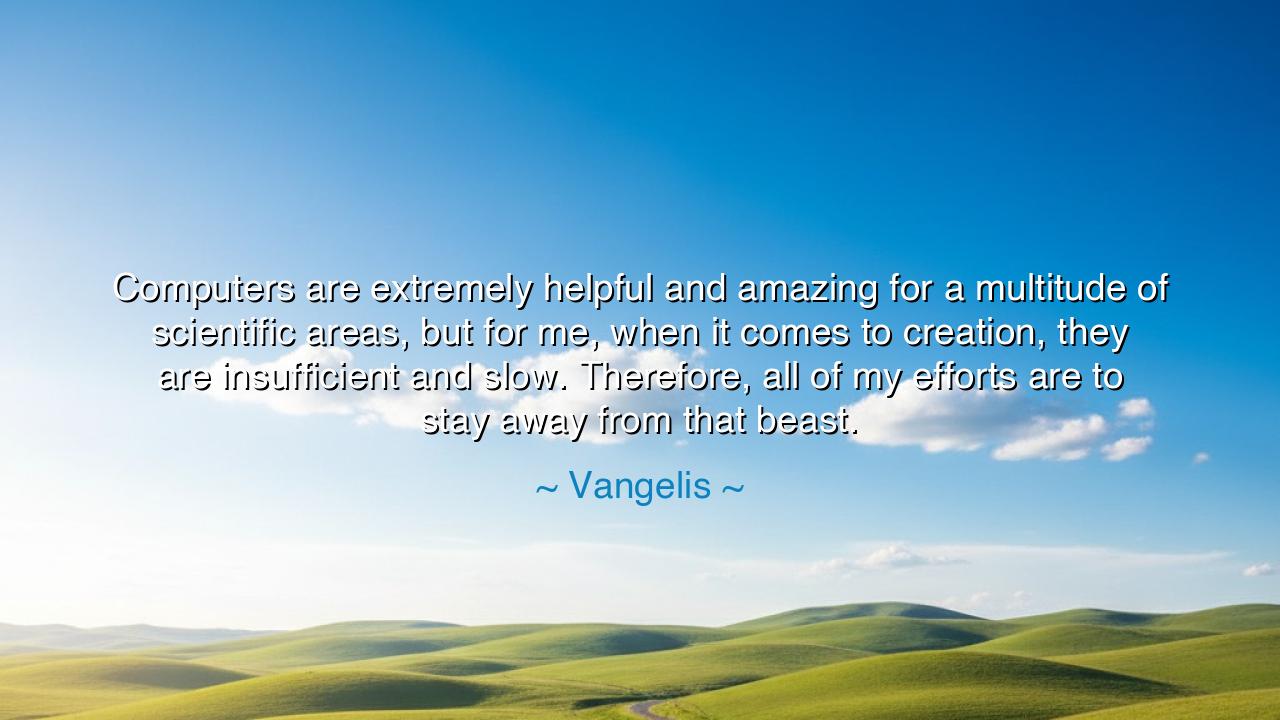
Computers are extremely helpful and amazing for a multitude of
Computers are extremely helpful and amazing for a multitude of scientific areas, but for me, when it comes to creation, they are insufficient and slow. Therefore, all of my efforts are to stay away from that beast.






The words of Vangelis — “Computers are extremely helpful and amazing for a multitude of scientific areas, but for me, when it comes to creation, they are insufficient and slow. Therefore, all of my efforts are to stay away from that beast.” — are a declaration of the artist’s sacred rebellion. In these words, he speaks not as a man of technology, but as a guardian of the soul’s flame. Beneath his statement lies a profound truth: that creation is not a calculation, and that the essence of art flows not through circuits, but through spirit. For Vangelis, music — and by extension, all art — must remain a living act, unchained from the sterile precision of machines.
In the ancient world, the poets and philosophers often spoke of the divine breath — the mysterious current that moves through human hands when they create something from nothing. It was said that when a sculptor carved marble, the gods guided his chisel; when a musician struck his lyre, the heavens themselves resonated. Vangelis, too, believed in this sacred channel. He saw computers as tools of logic, brilliant for measuring the stars and unraveling equations, yet lifeless when compared to the fire of inspiration. To him, true creation is an act of surrender — not control — and machines, with all their power, cannot surrender. They can only obey.
The origin of his reflection is rooted deeply in his own journey as a composer. From Chariots of Fire to Blade Runner, Vangelis shaped soundscapes that transcended technology, weaving emotion into the fabric of the cosmos. Though he used electronic instruments, he refused to become their servant. He approached synthesizers as living extensions of his being, not as machines to be programmed, but as instruments to be felt. His music was never about perfection, but presence — the immediacy of creation in real time. The computer, by contrast, he saw as a “beast” — capable of immense computation but devoid of heart.
His words recall the timeless story of Michelangelo, who, when asked how he sculpted David, replied, “I saw the angel in the marble and carved until I set him free.” Such is the essence of true creation — to see beyond form and function, to listen to what lies hidden within the silence. A computer could calculate the symmetry of David’s limbs or map every contour of the marble, yet it could never hear the whisper that guided Michelangelo’s hand. For, as Vangelis reminds us, art is not made by knowledge alone, but by communion — between artist and creation, soul and matter.
There is, too, a spiritual warning in his words. In calling the computer a “beast,” Vangelis does not condemn technology itself, but the danger of worshiping it. For when the creator becomes servant to the tool, art becomes imitation, not revelation. The ancients spoke of hubris — the arrogance of mortals who placed their faith in power rather than spirit. Today, that same arrogance manifests in the belief that machines can replicate the sacred spark of creation. Yet, the truth endures: no algorithm can feel awe; no code can weep; no processor can dream. These are the birthrights of the human soul.
Vangelis’s insight also carries a challenge for all who live in this digital age. We are surrounded by tools that promise efficiency, yet threaten to steal the intimacy of creation. To create is to struggle, to err, to wander through the unknown until beauty reveals itself. The computer, with its infinite undo buttons and automated precision, tempts us to bypass that struggle — but in doing so, we lose the essence of artistry itself. Creation must remain imperfect, for imperfection is the proof of life.
So, my children of the modern age, take heed of this wisdom: do not let your tools become your masters. Use them, but do not worship them. Let your hands remember what it feels like to touch, to build, to shape the world directly. Let your mind listen to silence before you fill it with data. And let your art — whether music, words, or craft — be born not from the hum of machines, but from the heartbeat of your own humanity. For in that heartbeat lies the pulse of eternity, the same rhythm that moved the first poets, the first dreamers, the first stars.
Thus, Vangelis’s words shall endure as a testament to the eternal struggle between mechanism and mystery, between calculation and creation. His warning is not a rejection of progress, but a plea for balance — that in our quest to build, we do not forget how to feel. The “beast” of technology is powerful, but it must bow before the spirit that wields it. For though the computer can simulate a song, only the soul can sing it. And when it does, the universe listens.






AAdministratorAdministrator
Welcome, honored guests. Please leave a comment, we will respond soon